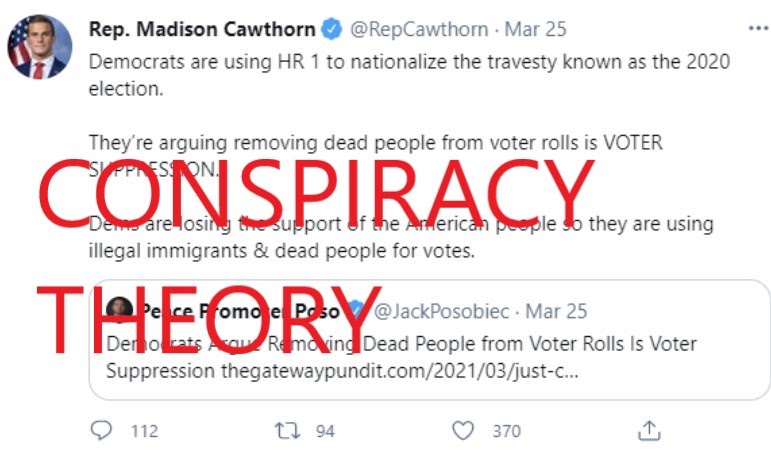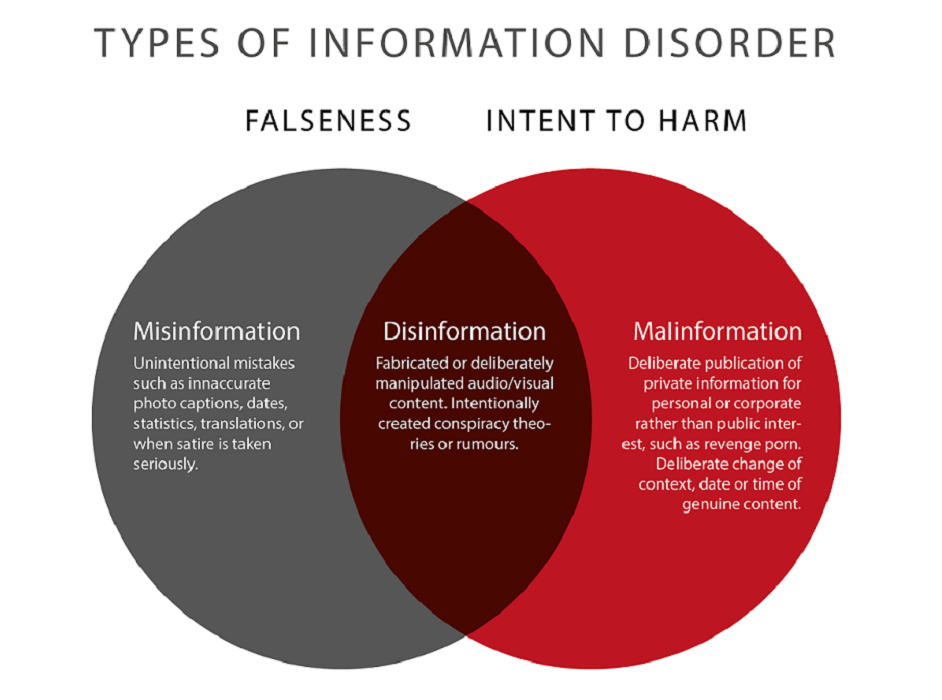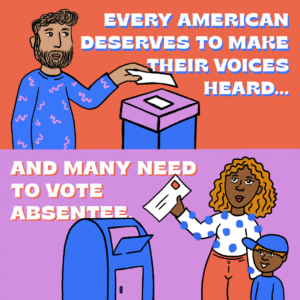How We The People Stood Up to Online Election Lies
Summary of Our History and Impact
Here at Common Cause, we believe that access to accurate information is essential to a healthy democracy. To encourage a strong democracy, we must protect our right to express and access the plurality of ideas and perspectives that we as Americans hold. This is why since 2016, we have been connecting voters to their local election information while tracking and removing false and malicious election content from social media. Over the many iterations of this program, we have developed and employed effective strategies to counteract and mitigate the harms caused by election lies.
Last year during the 2022 midterms, the Common Cause Social Media Monitoring program informed over 300 organizations on how to report on and combat election disinformation. Collectively, we created an environment that was so inhospitable to election deniers that they choose to concede. The success of this effort is attributed to the thousands of people who volunteered their time and energy to monitor social media and share election information. Our Social Media Monitoring program is proof that we the people have the power to protect our online spaces from attacks on democracy!
Online Election Disinformation: What it is and why is it harmful?
Election disinformation is false information targeted at communities to influence election outcomes. Before the boom of social media, this often looked like flyers, online advertisements, and even robocalls targeting minority neighborhoods with incorrect voting instructions. Social media platforms like Twitter, Facebook, and TikTok are just the latest tools used by disinformers to interfere with the public perception and results of our elections. Viral posts from right-wing podcasters and media pundits, politicians, and strings of hateful comments from bot accounts are just a few ways election conspiracies are overrepresented online.

Election disinformation: intentionally false content about elections designed to cause harm to a certain group.
- Incorrect voting results/ deadlines/ instructions
- Conspiracy theories about the election processes
- Falsified data/ images/ recordings
Disinformer: Someone who knowingly creates and/or shares content containing conspiracies and lies with the intent to cause harm.
Election Misinformation: unintentionally inaccurate content about elections.
- Sharing election disinformation you believe to be true
- Accidentally sharing out-of-date voting information
- Mistranslating voting instructions into different languages in an attempt to inform low-English proficiency communities.
Misinformer: someone who unknowingly engages with and shares incorrect information.

Online disinformation manipulates its believers into a state of political outrage and distrust that has led to violence against voters, elected officials, and election workers. I am not just talking about the armed insurrection attempt at the U.S. Capitol on Jan 6th, 2021, but also the continued harassment of election workers, and voters due to the ongoing conspiracy of widespread election fraud. Many Americans, especially those in marginalized communities, feared what would come with the 2022 midterms approaching.
Political conspiracies and lies driven by profit and power continue to have devastating effects on our democracy. Social media platforms, right-wing media pundits, and anti-democratic groups are enriching themselves, at our expense, by profiting off of online content containing election conspiracies. Partisan actors spend millions of dollars both directly and anonymously to incentivize the spread of anti-democratic content. Through this content, they also recruit supporters to participate, whether it is through sharing misinformation or engaging in voter intimidation. Conspiracies about insecure elections, coupled with the harshly felt inequities in this country, manufacture a culture of electoral distrust and civil unrest. Until our decision-makers and social media platforms act, it is up to the people to speak up and act collectively to stop the spread of online election lies.
Our Impact
Over the span of 6 months, our program monitored during the primary elections in 22 different states, the 2022 November midterm election, and the 2022 Georgia runoff election. Over 4,600 pieces of problematic content were submitted to our tiplines. Once a tip is submitted, our disinformation analyst Emma Steiner would contact platforms to get content violating terms and services removed, and inform our allies about emerging disinformation narratives. These tips were also used to create content that is specially designed to prevent the spread of election disinformation narratives. Our monitors shared this curated content in addition to connecting voters to the non-partisan Election Protection hotline.


Examples of content shared by our monitors to prevent the spread of election disinformation narratives.
All the ingredients were in place for disaster with hundreds of election-denying candidates in closely-contested races, a large majority of Republicans still believing the 2020 election was fraudulent, and Twitter and Facebook losing content moderation staff. However, the 2022 election was a tremendous victory for democracy. The combination of social media monitoring, journalists, and other election protection efforts educated the public so that they looked more skeptically at election denial.
Who we are and why we monitor!
Common Cause has been empowering our base to hold power accountable for upholding and expanding American democracy since 1970. With the emergence of online threats to democracy, we began to empower our members to become online citizen watchdogs. Our Social Media Monitoring program offers a hopeful alternative to the growing fear, distrust, and outrage surrounding our elections. Last year, the accessibility and flexibility of this direct action attracted 2,300 volunteers from across the country. Our program promises that all a person needs to make a difference online is a device with an internet connection, a list of words to copy and paste into the social media search bar, and basic tech support from staff and fellow monitors. While this program had an impact on the national stage, it also has had an impact on the monitors themselves!
When you think of who took to social media to fight the wave of online election lies, retirees armed with their laptops and social media instruction guides are probably not who you imagined. In fact, our ranks included a little bit of everyone: retirees and workers, people with and without disabilities, teachers and students, journalists and their readers. Led by me, a 22-year-old civil rights activist from Houston, TX. In 2021 I noticed how the waves of COVID-19 vaccine disinformation seemed to be customized to target marginalized communities. For Black communities in particular, they exploited our history of justified skepticism of public health entities and the government to target us with lies about the vaccines. With many of my own relatives falling victim to vaccine disinformation, I began studying and tracking the tactics of online disinformers so that I could better protect my community from lies meant to cause us harm. When I joined Common Cause to lead this program, I found myself in the company of other fed-up individuals who wanted to make a difference. Most notably, the veteran monitors from the Civic Listening Corps.
The Civic Listening Corps (CLC) is a year-round volunteer monitoring effort led by John Schmidt, the Engagement Coordinator of the Algorithmic Transparency Institute (ATI). The staff and monitors of the CLC are crucial allies to our monitoring program. Routinely monitoring with us on joint shifts, sharing tips gathered from years of monitoring, compiling lists of disinformers, and sharing with us Junkipedia- their civic listening software. The monitors and staff at the CLC are instrumental to our success in combatting and tracking online election lies in addition to many other topics. In fact, many of their monitors started here at Common Cause monitoring during the election seasons eventually following John to the Civic Listening Corps to continue monitoring a wider range of topics!
Many of us point to the 2016 election as the beginning of a culture of constant anxiety and distrust in both elections and our fellow Americans. Volunteer Monitor Kathy shared that election denialism “has created a wedge in our family that makes it very difficult to talk about what really matters to the family and the country” Instead of hopelessly watching as election lies spread to their community members, Monitors could “be part of something that could make a real difference in the rhetoric that is tossed about on social media!” according to volunteer Jill. Jill is not alone, many of our monitors shared similar reasons for getting involved. We are all connected by a deep concern for the current state of our democracy. I interviewed our volunteer leaders to learn more about what led them to join us in monitoring online election disinformation.
Reflections from our Social media Monitoring Captains
Who they are and why they chose to step up as volunteer leaders to fight back against online election lies.
Adrienne
Adrienne is semi-retired, based in California, and has been “committed to the truth for quite some time.” Since 2020, Adrienne has led the fight against online disinformation. She recalls scenes from her earlier years of environmental/ political research and activism. She describes her first formal protest, a march for women’s reproductive rights during the 1973 Roe v. Wade case. “We wore black armbands to school and marched through the park”. She adds while shaking her head “there were kids and adults catcalling us.”
When asked why she got involved in Common Cause’s Social Media Monitoring program, Adrienne pointed to 2015. She knew she had to once again get involved to fight the wave of blatant lies and lack of accountability for their impact. Today as a retiree, she is waist-deep in the fight against online disinformation. Adrienne warns that “People who are sewing distrust through the media know exactly what they are doing because they want to control the narrative, it’s frightening.”
Rob
For Rob, a retired software engineer and former journalism student based in North Carolina, Social Media Monitoring was the next step in getting politically involved, outside of the usual “text banking” activism they have done in the past.
When asked why this opportunity appealed to him, he cited the critical thinking involved in the monitoring process. “It took discernment to separate fact from fiction and satire from deception.” For Rob, this is a welcome alternative to “being a button pusher sending texts without discretion or analysis.” With a little encouragement, Rob decided to step up as a Volunteer Leader. If a monitor struggled with the technical aspect of monitoring, all they had to do was tag Rob in our volunteer Slack channels, and he was there to help! Rob spent his shifts sorting through the submissions sent in by the monitors and refining our searches. Rob explains that he has seen firsthand how disinformers “distort reality by blowing problems out of proportion or by creating problems that are entirely fictional.”
Thomas
Thomas, based in Washington State, has been monitoring since the monitoring program launched in 2020. Thomas was an Inoculation Captain who spent his shifts leading monitors in sharing pro-democracy content. He got involved because “otherwise I would just be doomscrolling!” Thomas and the other monitors often joked that they might as well report the content and doomscroll for a cause (as it were).
Thomas, who is a wheelchair user and hard of hearing, revealed: “there are not many volunteer opportunities for someone who is hard of hearing.” Phone banking, canvassing, and volunteer events without interpreters and COVID-19 precautions are often inaccessible to people with disabilities, who would otherwise be willing to volunteer. In Thomas’ case, accessibility features like closed captioning and virtual meetings offered Thomas a way to get involved. Thomas warns that election disinfo “is corrosive and makes it almost impossible to have an informed populace which is needed for democracy”.
Susan
Susan, a professor based in California, was our main shift captain, independently leading over 30 shifts over the span of 4 months. Susan credits her family, for her lifelong streak of activism and leadership. She recalls picketing a hotel where Nixon was staying in her early years! She has phone banked, text banked, and canvassed door to door. “For this round, I thought ‘I’ve done enough of that’ I want to do something less taxing and more meaningful!” When she stumbled upon our monitoring program, she found a community of what she described as “like-minded boomers, young people needing volunteer hours, and everything in between” All of them were concerned about what was happening on social media.
Susan explained that when doing this work she thinks about her son and the future that the younger generation deserves. “My generation was taught that the world was always going to get better and better.” This of course is not the reality we find ourselves in. With inequality on the rise and continuous environmental crises, many of the older monitors often expressed disbelief and even remorse at the state of the world and the uncertainty this creates for the future of younger generations. “I feel desperate to try and put everything back on track!”
With our monitoring program dormant until the next election season, many monitors including Adrienne, Rob, Susan, and Thomas are continuing to fight online lies with the Civic Listening Corps! To join them visit civiclistening.org/participate
What YOU can do to help us in our collective fight for Democracy!
1 Share your story with us and our allies fighting for a fair and free online!
One of the best ways to fight back against disinformers is to share your story. Those who seek to suppress the truth and diverse perspectives need to be held accountable for the harm that their election lies have caused! Because of the spread of election lies: lives have been lost, families have been torn apart, and Americans are being cheated out of their right to participate in our government. How has election mis/disinformation impacted you?
We want to hear from you! Share your Media and Democracy Story
2 Do not engage with content containing election disinformation.
Liking, commenting, and sharing (even screenshots) online election lies spreads its harmful message to your online community.
Instead:
- Report election disinformation to reportdisinfo.org
- Verify claims made about our elections at politifact.com
3 Join Common Cause as a volunteer Activist.
Common Cause has a 50-year track record in successfully mobilizing grassroots activists and volunteers toward collective action. Through both virtual and in-person action, we empower the people to participate in our government and push back against those who threaten democracy.
4 Learn more about the role that Media plays in Democracy
The right to freely access information and diverse opinions is so important that it was the first of our inalienable rights to be defined in our constitution. Our rights protected by the First Amendment face a modern threat with the rise of the internet. With the decline of local journalism, our ability to access information and fully participate in society is at the mercy of our Internet Service Providers and Big Tech.
See More: DisinformationGrassroots Activists